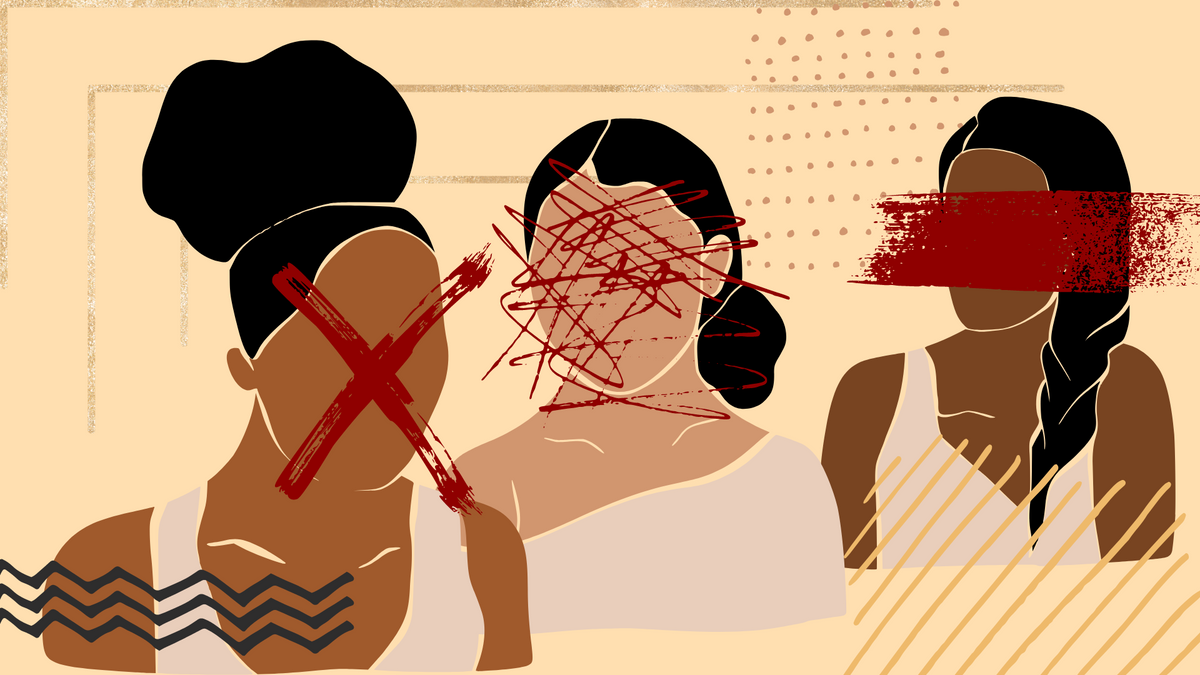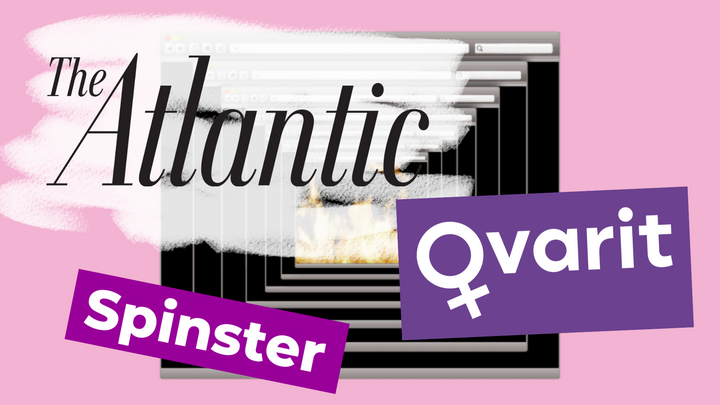Not One Texas Abortion Rights Org Will Use the Word "Woman"
While the state only explicitly bans abortions performed on "women," groups are driving away support with "inclusive" language

In the days following the SCOTUS decision to overturn 50 years of a Constitutional right to an abortion, supporters of abortion rights across the country have to provide support to local abortion funds and providers. But in Texas, a state with arguably some of the most draconian anti-abortion laws in the country, one word is conspicuously missing from the narrative: "woman."
Among a dozen local abortion access funders or providers in Texas, not one could be spotted discussing women's rights. Organizations like Fund Texas Choice discussed abortion in vague terms, only, affecting groups such as "people," "Texans," and "folx." Some organizations were more explicit, directly attempting to police those who use woman-centered language and narrowing their pool of supporters only to those who agreed.
The Clinic Access Support Network (CASN) posted a graphic on June 25, less than 24 hours after Roe v. Wade was overturned, urging us to "remember that it's not just women who are losing access. Trans people and nonbinary people also have abortions. Using 'pregnant person' ensures all people are represented!"
Other local Texas organizations such as Janes Due Process, the Buckle Bunnies Fund, and the Bridge Collective, Fund Texas Choice, West Fund, and La Frontera Fund have all carefully avoided using words like "woman," "women," or "girls" when discussing their work over the past few days.
#transrightsarehumanrights #pride #abortionishealthcare #roevwade #prochoice #abortion #SCOTUS #abortionfunds pic.twitter.com/rz7hE87vnZ
— Clinic Access Support Network (@casnhtx) June 25, 2022
Even groups like the Whole Woman’s Health Alliance, which actually includes the word "woman" in their name, have made efforts to distance themselves from the term. They rebranded themselves on Twitter as "(W)e (W)ork (H)ard for (A)bortion," an apparent attempt to erase women from their organization.
The only Texas abortion access organization I could find willing to discuss women at all is The Afiya Center, a group that aims to "build a robust Black women centered Reproductive Justice movement in Texas." The group alternates in their online materials between using "women" and "womxn" (a term designed to be inclusive of men who identify as women) depending on the program in question. Their website's language on abortion, at least, is unapologetically woman-centered:
"The Afiya Center has long recognized that for Black women there is a perceived double standard: we are stigmatized when we have children and are further shamed and stigmatized when we seek abortions. We are ready to expand our advocacy efforts to ensure all Texas women are truly supported — no matter her choice."
However, on June 24, the Afiya Center responded to the overturning of Roe v. Wade by tweeting:
"This decision disproportionately impacts Black womxn. We are 3-5x more likely to die from complications related to childbirth. Overturning Roe is another cruel step in making it more dangerous for Black mamas and birthing folx to give birth."
Organizations like CASN, the Afiya Center, the Buckle Bunnies Fund, and Janes Due Process do important, life-saving work that helps women and girls (regardless of how they identify). Yet, they are driving away desperately-needed support in a moment of crisis by removing the focus from women.
As Professor Steven Greene recently noted to the New York Times, "Activists are adopting symbols and language that are off-putting not just to the right but to people in the center and even liberals."
Some organizations appear even gleefully eager to turn away support for their work when it comes from the wrong type of feminist. "Cis women aren't the only people who get abortions. Using gender inclusive language makes our movement stronger," the Texas Equal Access Fund tweeted on June 27. "And just so you know, we are not a TERF-friendly space."
I stumbled upon this post while explicitly seeking out a local organization to support through donations or volunteer actions. Yet, their "inclusive language" clearly excluded me (I've often been labeled a "TERF" – or "Trans Exclusionary Radical Feminist" – though I reject the term). This group turned away my support when they need it the most.
And just so you know, we are not a TERF-friendly space.
— Texas Equal Access Fund (@TEAFund) June 27, 2022
The Texas Equal Access Fund is wrong that inclusive language will garner more support for the movement. In fact, it likely does the opposite. Feminist campaigner Natasha Chart pointed out in a recent article for 4W on how the Democrats failed on abortion, polling shows that woman-centered language increases support for abortion rights by nine points. As Sarah Kliff wrote for Vox, "This is especially notable when you consider that most of the people we polled — more than three-quarters — said they held their views on abortion strongly."
The goal of this erasure is allegedly to be inclusive of women and girls who have attempted to opt out of their femaleness, but still find themselves in need of an abortion. Usually, they identify as "trans men" or "non-binary," and the number of abortions performed on this population is vanishingly small.
According to a 2020 study by the Guttmacher Institute, an estimated 462 - 530 "transgender and gender non-binary" individuals obtained abortions across the entire United States in 2017. That same year, 862,320 abortions total took place in the US – making the number of abortions for trans-identifying individuals 0.0614621% of all abortions (max).
The reality is that organizations like the Texas Equal Access Fund are intentionally turning away support for work that will save the lives of women and girls to cater to 0.06% of their target population.
This isn't a new phenomenon. I wrote back in 2019 about my experience volunteering for Women's Way, a Philadelphia non-profit founded in the 70s to help fund abortions. By 2019, the group was part of a larger coalition of abortion funders that had essentially banned the word "woman" from their lexicon. The Executive Director of the organization confided in me that she was concerned about this trend, but feared that if she didn't follow the tide she would be fired, replaced by the board with a more woke ED.
Perhaps the most ironic twist of all is that in Texas (and a few other states), the laws banning abortion actually only apply to women.
SB. 8, the Texas law which bans abortion after the detection of a fetal heartbeat, uses very clear woman-centered language throughout its text. It states, in part:
"Except as provided by Section 171.205, a physician may not knowingly perform or induce an abortion on a pregnant woman..."
The rest of the text is also very woman-centered, with definitions referencing women across the board.
This creates a bizarre loophole in which abortions on individuals who are not legally women may actually still be permitted. Changing your legal sex in Texas is relatively easy. The process is about as complicated as getting your driver's license or getting married, requiring only a form, a note from a mental health provider attesting to your diagnosis (so-called "sex-change surgeries" or medical intervention are not required), a fee (which may be waved), and a trip down to the local office.
In practice, it's unlikely that any doctor would take the risk of performing an otherwise illegal abortion on a woman who has had her sex markers changed on legal paperwork. We have no idea how the courts would handle such a case, and a simple amendment to the law would close the loophole right up. But the trans loophole does prove one thing: women are being targetted in Texas. Not "people who get pregnant" or "uterus havers." Women.
Any abortion rights group trying to tell you otherwise is not fit for purpose.
Do you want to bring the "gender madness" to an end? Help us write about it! 4W is able to pay our all-female staff and writers thanks to the generous support of our paid monthly subscribers.
Enter your email below to sign in or become a 4W member and join the conversation.
(Already did this? Try refreshing the page!)





Comments